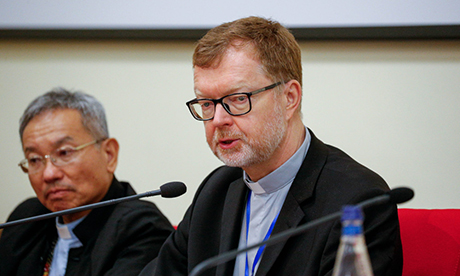A top anti-abuse expert has highlighted the lack of accountability by the Catholic Church in implementing safeguarding norms established to protect children and vulnerable individuals.
While the Church has been praised for its efforts in establishing norms to protect individuals from abuse, “we don’t have a culture of accountability when it comes to the implementation of those norms,” said Jesuit Fr Hans Zollner (pictured), a leading expert in the field.
Certain norms have even been put in place to hold bishops accountable for mishandling abuse allegations. However, the review process often results in varied outcomes. Some bishops are asked to resign, while others face no consequences at all, said Zollner.
“How seriously does the legislator take his own law?” asked Fr Zollner, questioning the seriousness with which Pope Francis, the legislator behind these norms, regards his own laws.
Fr Zollner, the director of the Institute of Anthropology at Rome’s Pontifical Gregorian University, made the remarks during the 2023 International Safeguarding Conference held at the Gregorian University.
More than 200 bishops, safeguarding officers, and specialists from 50 nations gathered to discuss “sustaining organisational accountability” at the conference.
Beatrice Mumbi, safeguarding coordinator for the Jesuit Conference of Africa and Madagascar, also addressed the issue of accountability. She expressed the difficulty of ensuring compliance and accountability among the men she works with due to the persistence of patriarchy in her context.
Moreover, Mumbi highlighted the prevalent “culture of silence” surrounding sexual abuse in many African cultures, where discussing such matters is seen as taboo to avoid tarnishing the reputation of leaders.
However, Mumbi noted a gradual change taking place, albeit at a slow pace. Efforts are underway to address accountability, but it continues to pose an ongoing challenge.
Safeguarding a universal problem
Archbishop Paul-André Durocher of Gatineau, Quebec, and Archbishop Simon Poh of Kuching, Malaysia, discussed the challenges faced by church authorities regarding accountability during the conference.
Archbishop Poh revealed that safeguarding programmes in Asia are still in their early stages and emphasised it is a universal problem.
“Maybe seven, eight years ago, the thinking was that this is a Western problem. That was the mentality,” the archbishop said. But now people realise “it is not a Western problem; it is a human problem.”
Archbishop Durocher highlighted the progress made in Canada over the past three decades. Bishops have shifted their focus from establishing structures to investigate allegations to prioritising the needs of victims and listening to their experiences with compassion and understanding.
“The sexual abuse crisis has deeply hurt that bond of trust between bishops and priests, between laity and clergy, between believers and non-believers,” the archbishop said. “It will take a long time to rebuild that trust, probably a few generations. And it will happen only if we continually to make it a priority – if I, as a bishop, make it my priority.”
Sources
